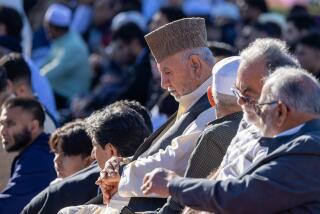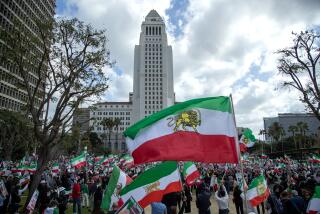Iran celebrates all night long
- Share via
TEHRAN — Iranians recited poetry, shared stories and ate fruits and nuts Saturday during all-night celebrations of the longest night of the year, a tradition going back thousands of years to when Zoroastrianism was the predominant religion of ancient Persia.
For many Iranians, the celebration, known as Yalda, offers a link with ancient traditions as well as a chance to gather with family.
“Almost all Iranians, no matter their religion, language and race, celebrate Yalda,” said Hooshang Sohaei as he stood in a long line at a confectionary shop in north Tehran to buy sweets and dried fruit.
Zoroastrianism’s central theme is the struggle between the good spirit Ahura Mazda and the evil Ahriman. Yalda, marked on the winter solstice, recognizes the symbolic victory of light over darkness as daytime starts growing longer and nights become shorter.
In the streets of Tehran, fruit vendors enjoyed their busiest day of the year, and confectioneries were packed with customers buying up provisions for the feast.
Traditionally, families and friends sit around a furnace, and elders recite tales or read poetry, often from the Shahnameh, an ancient epic by Iran’s greatest storyteller, Ferdowsi.
Others debate the latest domestic and international developments, which these days means the economic crisis, Iran’s nuclear program and the recent shoe-throwing incident involving President Bush and an angry Iraqi journalist.
The national celebration, like several other pre-Islamic holidays, has survived the advent of Islam and efforts after the 1979 Islamic Revolution by hard-line clerics to discourage such festivals as un-Islamic.
Zoroastrianism lost dominance in Iran after Muslim Arabs conquered Persia in the 7th century, with many adherents fleeing to India. Today, most of Iran’s 65 million people are Shiite Muslims.
But some 60,000 Zoroastrians remain today -- down from 300,000 in the 1970s, when many emigrated to the United States. Iran also has small Christian and Jewish communities.
More to Read
Sign up for Essential California
The most important California stories and recommendations in your inbox every morning.
You may occasionally receive promotional content from the Los Angeles Times.










